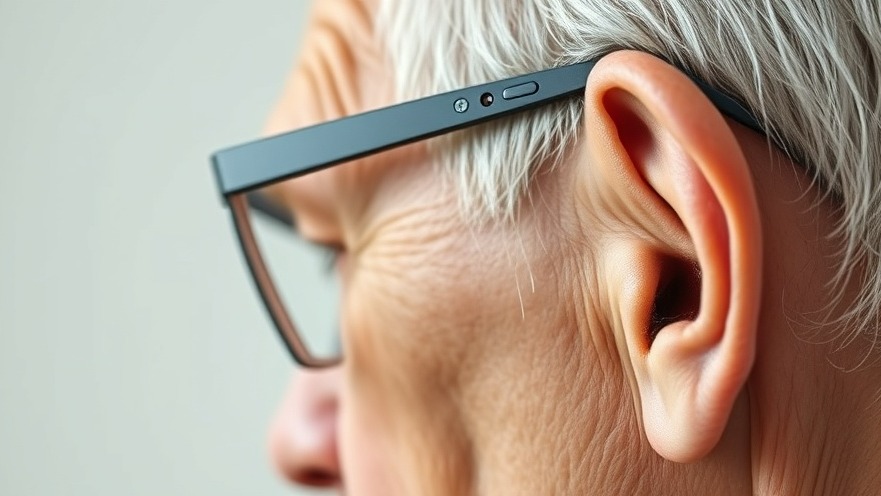
AI Glasses Pioneering a New Era in Hearing Assistance
Imagine a world where those with hearing loss can seamlessly engage in conversations, even amidst loud, bustling environments. A remarkable breakthrough in technology, spearheaded by researchers at the University of Stirling, is set to revolutionize audio experiences for the hearing impaired through the development of artificial intelligence (AI) glasses. This innovative device not only filters background noise but also aids in understanding speech through advanced audio-visual integration.
How AI Glasses Work
The AI glasses feature a small camera that captures the lip movements of the speaker, while a seamless integration with a smartphone app enables real-time data transmission via 5G technology. This powerful collaboration results in audio signals being sent to a cloud server, where AI processes and isolates the speaker's voice from the chaotic surrounding sounds, making it easier for listeners with hearing challenges to decode speech accurately.
The Science Behind Audio-Visual Speech Enhancement
This process, known as audio-visual speech enhancement, takes advantage of the intrinsic link between what we see and what we hear. By aligning visual cues with auditory inputs, these AI glasses provide a unique approach to augmenting hearing capabilities. Traditional noise-canceling technologies often fall short in environments with overlapping voices or rich background sounds—a gap the AI glasses are designed to fill.
Expert Insights on Future Possibilities
Dr. Ahsan Adeel, an Associate Professor at the University of Stirling, emphasizes that this technology is just the beginning. The research team is advancing towards utilizing the capabilities of pyramidal cells in the mammalian neocortex to develop neurobiologically inspired hearing aids. This upgrade promises not just enhanced performance comparable to human listening capabilities but also minimal power consumption and reduced latency.
Challenges Addressed: Delay, Privacy, and Cost
The transition to this next-generation AI system addresses long-standing concerns associated with hearing aids. By eliminating delays in audio processing, ensuring user privacy, and striving for affordability, the creators aim to make advanced hearing assistance available to a broader spectrum of users, leading to a significant improvement in the quality of everyday interaction for those with hearing disabilities.
Implications for Healthcare Practitioners
For concierge health practitioners, staying ahead of technological advancements like AI-powered glasses can profoundly impact patient care. As these devices become more mainstream, awareness of their availability and functionality will be crucial during patient consultations. Understanding the nuances of these glasses can empower health practitioners to recommend tailor-fit solutions for hearing-impaired patients, ensuring that they regain an active role in social interactions.
Patient Perspectives: A Game Changer for Communication
Patients with hearing impairments often report feeling isolated in social situations. The introduction of AI glasses could be a game changer, fostering a sense of inclusion and connection. By improving how they perceive conversations, patients can interact more fully in group settings, reduce social anxiety related to misunderstanding dialogue, and enhance their overall quality of life.
Steps for Practitioners: Embracing Technology
As AI glasses continue to evolve, healthcare practitioners should consider the following steps:
Stay informed: Regularly update your knowledge on evolving technology impacting hearing aids and enhancements.
Network with specialists: Collaborate with speech therapists and audiologists to better understand the capabilities of these new devices.
Provide tailored recommendations: Assess individual patient needs when discussing technological solutions, ensuring they align with personal communication goals.
Educate patients: Facilitate open communication with patients about new technologies to empower their choices in hearing assistance.
Conclusion: A Promising Future for Hearing Aids
The development of AI glasses represents a significant leap forward in how hearing loss can be addressed. As the technology continues to develop and becomes integral within healthcare discussions, health practitioners can play a pivotal role in shaping patient experiences. By embracing this cutting-edge solution, they can enhance not only the communication capabilities of their patients but also their overall quality of life.
Stay engaged with technological advancements like these to better serve your patients. Knowledge is power, and with tools like AI glasses available, you can facilitate a new era for those facing hearing challenges.
 Add Row
Add Row  Add
Add 




Write A Comment